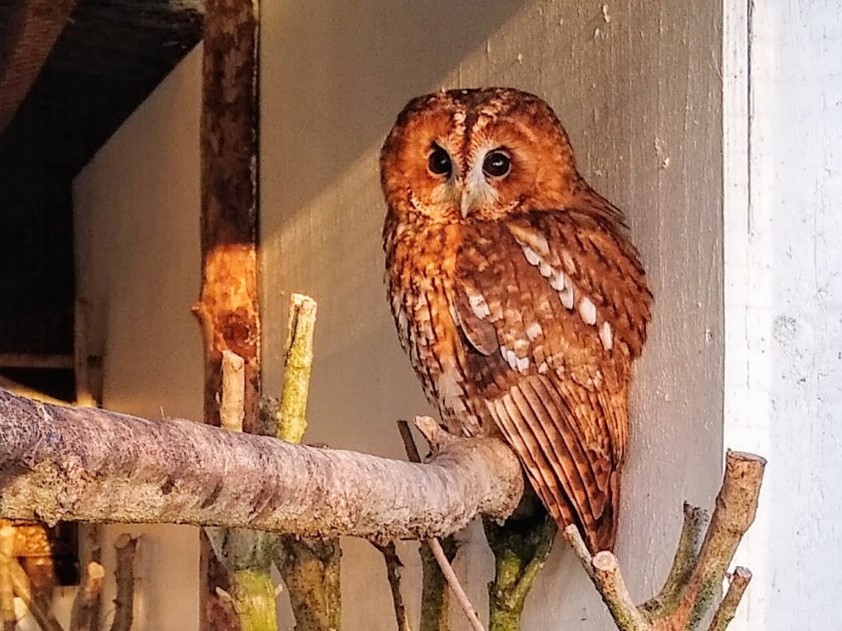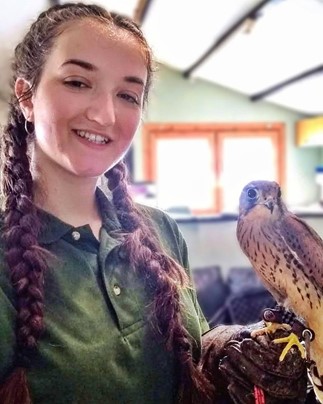Written by Isobel Baker, second-year BSc Ecology & Wildlife Conservation student
Hi I’m Izzy! I am a second-year BSc Ecology & Wildlife Conservation student, and I have been volunteering with Suffolk Owl Sanctuary since July 2020. Here I share my experiences volunteering in the animal management sector, and my top tips for finding volunteer opportunities.

Why did you decide to volunteer?
I decided to explore volunteering opportunities in the summer prior to my second academic year. I knew I wanted to undertake a placement year in my third year, so I wanted to build upon my skills and experience whilst I had a stretch of time free from studies. Working with animals is an incredibly competitive career sector, therefore any practical experience you can build can help you stand out from the crowd. I’ve always been interested in birds of prey, and I could see that this opportunity was a very hands-on learning opportunity.
What do you do as a volunteer?
On a typical workday, we will start by cleaning the night boxes of birds, then we will move on to aviaries. This involves cleaning water baths, removing old food, washing perches and raking over the gravel floors. A lot of work and time goes into cleaning and maintaining animal exhibits to a high standard. I personally really enjoy this aspect of the role, because the high standards of animal husbandry are reflected in the animals’ behaviour and wellness, and this resonates with the general public. Happy owls, happy people!

I also assist at flying displays, help with the general upkeep of visitor spaces, and carry out feed rounds. This is one of my favourite parts of the day as I get to visit around 100 different animals to give them their dinner.

Though there’s a set structure to the day in terms of the order of activities, I really enjoy the variety of the role. One day I may be helping with the training and flying of the centre birds, the next prepping food for the animals or assisting with injured wild birds in the raptor hospital. It’s been a real privilege to assist in the rehabilitation of these birds and to play a part in the conservation of the UK’s wild raptors.
I firmly believe that you get out what you put into volunteering, for instance, it is clear that I am more than willing to get stuck in and get my hands dirty, in fact, my first ever task was to gut and prepare food for the feed round. People can see how hard I work, therefore, in turn, I get to experience new opportunities, such as flying the birds, learning falconers knots so I can move birds safely on my own, and more recently, helping with the ferrets, meerkats and foxes.
What are your favourite aspects of the role?
I love getting my hands dirty! I really am at my happiest when covered in mud in the torrential rain or getting covered in animal poo. I think this just adds a sense of adventure to the job. If you’re not prepared to get your hands dirty or work in all weathers, perhaps animal management isn’t for you.
I also enjoy the more personable element of the role. I love being part of the team, and they have really taken the time to teach me new skills. Their dedication to my learning has been invaluable, providing me with skills for my future career such as animal handling, animal husbandry and practical skills that you simply cannot learn from a textbook.
How has this experience helped you and what are your plans for the future?
As someone who has completely diverted their chosen field from engineering-based A-levels to my lifelong passion for animals, I am always exploring new opportunities and learning. You’ll only know what you like and dislike from giving it a go. I love every minute volunteering at Suffolk Owl Sanctuary, so I’m currently exploring the idea of animal management pathways. Maybe one day in the future I’ll be working there fulltime!
My top tips for applying and working at volunteer opportunities
- Persevere with your applications – we’re in the middle of a pandemic, so if people cannot take you on this year that’s understandable. But make sure to leave them with a copy of your CV and cover letter! At the very least, it’s a networking opportunity, and they might contact you in future.
- Demonstrate your passion! A lot of people can say on paper that they like animals or that they took GCSE Biology. Sometimes I think the standard formats for applications can be a bit rigid, so at my own risk, I tend to mention something more informal, unique and personal about myself. I think it livens up my applications and gives employers a real sense of my personality, not just a list of qualifications. Personally, it’s never failed me!
- Don’t expect to do everything on your first day – Like starting any new job, it’s a learning curve. Take everything in your stride, ask questions, learn. Once you find your feet, you’ll be much more independent and get to experience lots of new opportunities!
Izzy also runs her own wildlife blog: www.izzysgonewild.business.blog
And if you are also interested, she updates her accompanying Instagram blog most frequently with her wildlife photography!